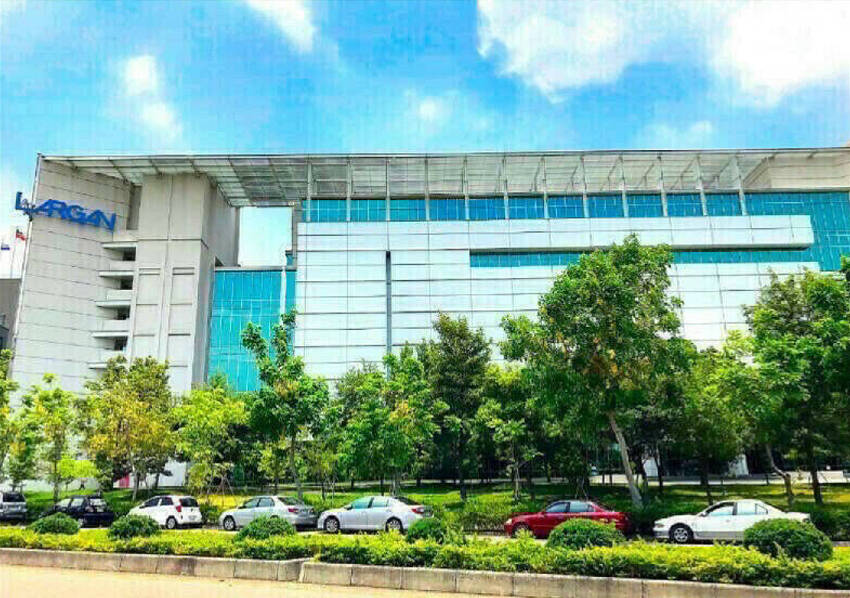Largan Precision Co (大立光), the nation’s leading handset camera lens maker, yesterday reported the highest earnings per share (EPS) for the first quarter in five years, as the company’s shares closed up by the daily maximum following days of selling.
EPS came in at NT$48.28, compared with NT$45.79 a year earlier, as the company’s net profit grew 5.44 percent year-on-year to NT$6.44 billion (US$195.9 million) from NT$6.11 billion, the company’s financial report showed.
Operating income increased 54 percent to NT$6.09 billion, but non-operating income fell 53 percent to NT$1.63 billion, the report showed.

Photo: Chen Mei-ying, Taipei Times
Gross margin improved to 54.63 percent from 49.17 percent, while operating margin improved to 41.8 percent from 35 percent, it showed.
Revenue is expected to grow more slowly in the second quarter from NT$14.58 billion in the first quarter due to seasonal factors, Largan executive officer Adam Lin (林恩平) said, adding that the US tariffs would not have a direct impact on the company’s operations.
“April sales would be weaker than March’s, and May would be even softer than April, as the second quarter typically marks the off-season for the industry,” Lin said at an online earnings conference.
As the company does not ship products directly to the US, but mostly to China and other Asian countries, a higher US tariff is not expected to affect its shipments directly, Lin said.
So far, the company has not seen signs of clients front-loading shipments, rescheduling shipping locations, or changing their purchase prices in response to the US tariff policy, he said.
In the first quarter, high-end smartphone camera lenses with resolutions above 20 megapixels accounted for about 20 to 30 percent of the company’s total shipments, lenses with 10 megapixels comprised roughly 60 to 70 percent, and lenses with 8 megapixels or fewer made up less than 10 percent, while other products took up about 10 to 20 percent, the financial report showed.
The company is capable of mass producing high-end camera lenses for Apple Inc when its key client is to release the new iPhone product line in the third quarter, Lin said.
The company is also finding no difficulty in supplying lenses for slimmer and foldable handsets, although such demand remains limited in terms of orders, he said.
As for the lens maker’s development in the humanoid service robot sector, demand for high-precision visual recognition products from its customers is likely to grow, Lin said.
Largan’s shares closed 10 percent higher at NT$1,980 yesterday, on the back of US President Donald Trump’s announcement of a 90-day pause of his “reciprocal” tariffs.
Asked whether the company would implement share buybacks to gain investors’ confidence and steady the stock’s recent fluctuations, Lin said the company’s board of directors would consider the matter, without elaborating.

IN THE AIR: While most companies said they were committed to North American operations, some added that production and costs would depend on the outcome of a US trade probe Leading local contract electronics makers Wistron Corp (緯創), Quanta Computer Inc (廣達), Inventec Corp (英業達) and Compal Electronics Inc (仁寶) are to maintain their North American expansion plans, despite Washington’s 20 percent tariff on Taiwanese goods. Wistron said it has long maintained a presence in the US, while distributing production across Taiwan, North America, Southeast Asia and Europe. The company is in talks with customers to align capacity with their site preferences, a company official told the Taipei Times by telephone on Friday. The company is still in talks with clients over who would bear the tariff costs, with the outcome pending further

NEGOTIATIONS: Semiconductors play an outsized role in Taiwan’s industrial and economic development and are a major driver of the Taiwan-US trade imbalance With US President Donald Trump threatening to impose tariffs on semiconductors, Taiwan is expected to face a significant challenge, as information and communications technology (ICT) products account for more than 70 percent of its exports to the US, Chung-Hua Institution for Economic Research (CIER, 中華經濟研究院) president Lien Hsien-ming (連賢明) said on Friday. Compared with other countries, semiconductors play a disproportionately large role in Taiwan’s industrial and economic development, Lien said. As the sixth-largest contributor to the US trade deficit, Taiwan recorded a US$73.9 billion trade surplus with the US last year — up from US$47.8 billion in 2023 — driven by strong

A proposed 100 percent tariff on chip imports announced by US President Donald Trump could shift more of Taiwan’s semiconductor production overseas, a Taiwan Institute of Economic Research (TIER) researcher said yesterday. Trump’s tariff policy will accelerate the global semiconductor industry’s pace to establish roots in the US, leading to higher supply chain costs and ultimately raising prices of consumer electronics and creating uncertainty for future market demand, Arisa Liu (劉佩真) at the institute’s Taiwan Industry Economics Database said in a telephone interview. Trump’s move signals his intention to "restore the glory of the US semiconductor industry," Liu noted, saying that

AI: Softbank’s stake increases in Nvidia and TSMC reflect Masayoshi Son’s effort to gain a foothold in key nodes of the AI value chain, from chip design to data infrastructure Softbank Group Corp is building up stakes in Nvidia Corp and Taiwan Semiconductor Manufacturing Co (TSMC, 台積電), the latest reflection of founder Masayoshi Son’s focus on the tools and hardware underpinning artificial intelligence (AI). The Japanese technology investor raised its stake in Nvidia to about US$3 billion by the end of March, up from US$1 billion in the prior quarter, regulatory filings showed. It bought about US$330 million worth of TSMC shares and US$170 million in Oracle Corp, they showed. Softbank’s signature Vision Fund has also monetized almost US$2 billion of public and private assets in the first half of this year,